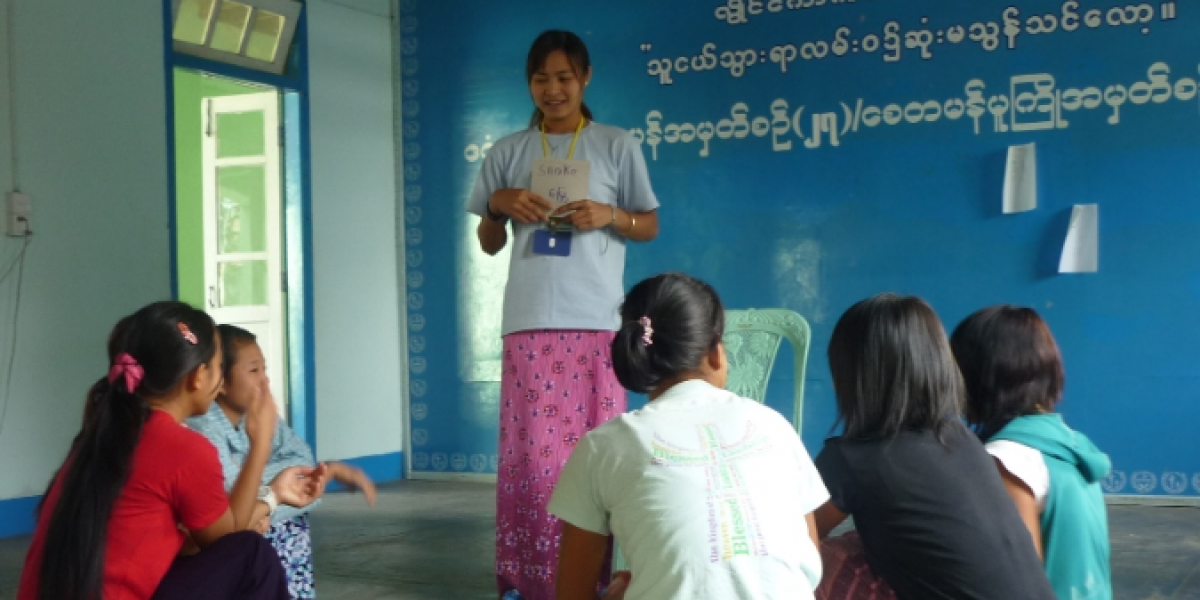Myanmar- Training the next generation of teachers
23 April 2015

The seven month long JRS Myanmar (JRSMMR) Teacher Training Programme is focused on building skills. Some of the learning the trainees undertake includes personal values “formation” which helps them to know their own identity. This has already afforded some of the students from IDP backgrounds the time and space to process their post-traumatic stress disorder (PTSD) symptoms in a safe environment, as well as to dream big for their own futures and that of their country.
.
The main focus of the curriculum is, of course, teaching skills – including: lesson planning, classroom management, group work, as well as integrating sustainable practices into everyday life like organic farming, designing clean burning stoves and promoting both in local villages. Human Rights awareness, anti-human trafficking awareness and advocacy skills will also be developed during the course.
.
The 14 female and 3 male trainee teachers begin their day by cooking breakfast together in the tidy kitchen and dining room they share. Their training then takes place in a nearby multi-purpose hall on Monday to Friday from 9am – 11:30am, when they return home to cook lunch. They are back in the classroom or attending English lessons in their communal dining area by 2pm each day, the afternoon session lasting for at least one and a half hours.
.
Moses, the JRSMMR Project Director who delivers English lessons three days per week explains, “So far we have only had a few sessions but the trainees are responding well to the English curriculum which is of my own design after ten years of practice in the Kachin context. It covers the four skills (reading, writing, listening and speaking) as well as plenty of vocabulary and pronunciation in a way that is relevant to the students here”.
.
Between 4pm-6pm every evening the trainees can be found working on chores or lesson review, after which they disagree about what to watch on TV, listen to music, play on their phones and hang out together – much like many other 18-29-year olds around the world.
.
Even with this demanding schedule, the group have found the time to take two high school drop outs under their wing. “When she first came here and we asked her to prepare an onion, the most she could do was find one and hand it to you. Now if we ask her to prepare an onion she takes it from storage, peels it and slices it nicely, ready to go into the pan. She has become a great help and is participating well in lessons too”, shared one teacher trainee living in the group house where they also support two young people who did not qualify for the course (did not graduate from High School) but came to them under emergency circumstances. One of these, described above, is now well on her way to becoming a teacher aid and maybe one day having a chance to re-sit her high school exams.
.
As if all this were not enough, the trainees have also been making their community safer by asking the elders to help organise night patrols around the village. But creating a sense of community is not restricted to the immediate geographical area. JRSMMR recently invited local orphanage tutors and boarding house supervisors from a nearby IDP Camp to join the teacher trainees in a workshop on ‘Teaching through Games to Assist all three Learning Styles (visual, auditory and kinesthetic)” which was run by Junita Calder, the previous JRS Asia Pacific Regional Advocacy and Communications Officer.
.
After the session, the young people decided to get together again, possibly monthly, for meetings of a local ‘teachers and youth workers support group’ – “That would be really great”, agreed Irene, JRSMMR Education Director, “it will be wonderful if they can support each other and share resources, no matter if JRS can continue here or not. After all, these young people are the ones who will be shaping the future of Myanmar”.
.
If the energy and generosity displayed by this group of young Myanmar teachers-in-training after just two months together is anything to go by, that future will be bright indeed. At the end of March our 15 trainees completed their training and are eager to start teaching young children. They are calling themselves the new generation of Myanmar.


